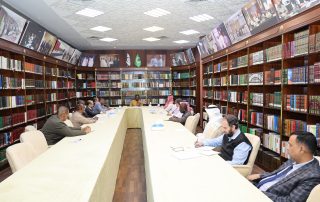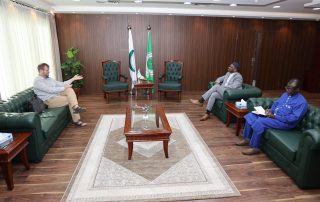
At the kind invitation of Arabic Wikipedia, Mr Jawzi Lardjane, Head of the Translation Division at the International Islamic Fiqh Academy (IIFA), participated in the first online conference of Arabic Wikipedia, organized by Wikipedia Arab World in cooperation with the Wikimedia Foundation, with a paper entitled: Between English and French Wikipedia: Lessons and Positions, delivered on the first day of the conference, which lasted for three days, starting from Friday 11 Rabi Al-Awal 1443 (17 October 2021).
His speech focused on the problems and challenges faced by Arabic and non-Arabic speaking readers and editors of Wikipedia and how to use other languages to enrich Arabic content on the one hand and to use the latter, on the other, to correct and guide the English and French content on topics related to Islam and Islamic culture. Hence, this aims to avoid contradictory information and misconceptions, especially in articles related to the Muslim world and communities, which fall under what has been described as the edit war, aiming to enlighten or mislead the public opinion depending on editors’ different views.
Mr Jawzi Lardjane drew attention to the need to unify the content and style in different languages on Wikipedia in order to contribute to the fight against Islamophobia, citing various statistics and studies. In this context, he stressed the importance of revising and correcting scientific and religious terms and concepts, which have not received proper consideration on the free encyclopedia compared to other encyclopedias, despite the breadth of Wikipedia’s content.
He also stressed the importance of translation in enriching Arabic content on the internet in general and on Wikipedia in particular. These goals cannot be achieved without encouraging high-tech experts to enhance translation and linguistic programs in Arabic. This encourages and facilitates translation, writing and research, as in the case of Asian languages such as Japanese and Chinese. In fact, the use of the Arabic language on the internet remains very low compared to the number of its speakers.
Mr Lardjane recommended that the conference committee establish strategic partnerships with official and non-official organizations, citing the pioneering experience of IIFA in the field of Islamic knowledge and fatwas. In addition, he pointed out that there are similarities between the concept of knowledge according to Wikipedia founders and the concept of knowledge-based and digital Awqaf, which represent modern means to develop and enrich knowledge in the virtual space.
At the end of the speech, he answered some questions, the most important of which is the relationship between students, researchers and the free encyclopedia and its impact on them. He pointed out that this issue is a relative and understandable issue, which reflects the credibility of virtual encyclopedias and the situation of educational programs and scientific standards followed by educational bodies and research centers. Moreover, that these problems often stem from students and researchers’ culture and ethics, who are supposed to leave their mark on their work, not attribute it to others, and not limit themselves to a single source in research and studies, following what Allah the Almighty said: “O you who have believed, if there comes to you a disobedient one with information, investigate, lest you harm a people out of ignorance and become, over what you have done, regretful.” (Hujurat 49:6), and hadith of Allah’s Messenger PBUH: “Allah loves that whenever any of you do something, you should perfect it” reported by Bayhaqi in Shu’ab al-Iman, branches of faith.
Founded on 15 January 2001 by Jimmy Wales and Larry Sanger, Wikipedia is among the ten most influential websites after search engines and social networks and the largest virtual encyclopedia. Mr. Jawzi Lardjane is an active editor on Wikipedia and is credited with updating and monitoring the IIFA articles on Wikipedia in English and French, which has helped promote IIFA on the internet, in addition to his volunteer activity in translating and editing many articles and filtering misinformation in various topics.
Read Also
Lastest








